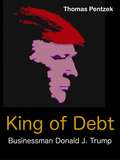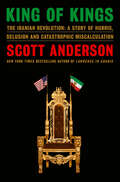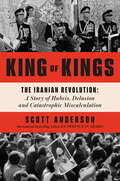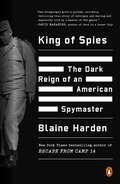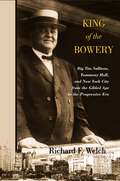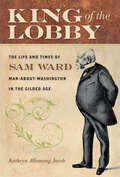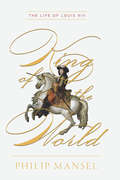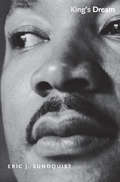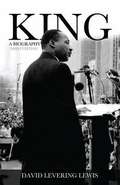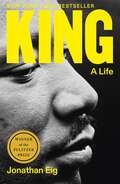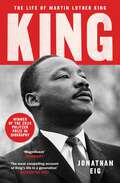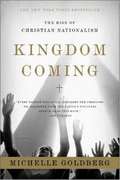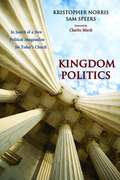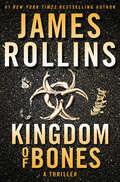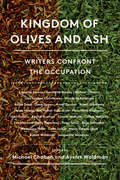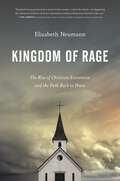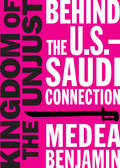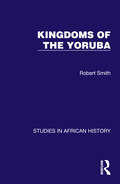- Table View
- List View
King of Debt – Businessman Donald J. Trump
by Thomas PentzekWho is Donald J. Trump? That’s what the whole world has been wanting to know since November 2016! Those who live outside the US only knew him from his appearances on the reality show The Apprentice, in which he presented himself as a successful businessman. One thing stands out, however: where other millionaires or billionaires shy away from the public, Trump takes every opportunity to put himself out there, to the extent that it is difficult to separate reality from the perfect performance. When researching for my book The King of Debts, I had the opportunity to study the successes and failures of Donald Trump. Every additional affair, every professional failure and every attack on the media I discovered shocked me more. Slowly a picture emerged of the billionaire who in 2017 became the president of one of the most important countries in the world. Why does he react the way he does? Why does he act the way he does? What is the basis for his success in the US?
King of Fools: The Dark Truth Behind the Romantic Legend of Edward & Wallis
by John ParkerWas the Duke of Windsor a tragic romantic torn by duty & desire? Was he merely a shallow weakling, lacking the character to fulfill his destiny? Or was he something more villainous? In this startling biography, top British journalist John Parker exposes the Duke's & Duchess's ties with Nazis, Fascists, organized crime, gambling, sexual deviance - and even murder - to reveal a couple who compromised the integrity of the British monarchy & ultimately put all of Europe in danger.
King of Kings: The Iranian Revolution: A Story of Hubris, Delusion and Catastrophic Miscalculation
by Scott AndersonNew Year’s Eve, 1977, on a state visit to Iran, President Jimmy Carter toasted Shah Mohammad Reza Pahlavi, King of Kings, Light of the Aryans, Shadow of God on Earth, praising Iran as “an island of stability “ due to “your leadership and the respect and admiration and love which your people give to you.” <p> Iran had the world’s fifth largest army and was awash in billions of dollars in oil revenues. Construction cranes dotted the skyline of its booming capital, Tehran. The regime’s feared secret police force SAVAK had crushed communist opposition, and the Shah had bought off the conservative Muslim clergy inside the country. He seemed invulnerable, and invaluable to the United States as an ally in the Cold War. <p> Fourteen months later the Shah fled Iran into exile, forced from the throne by a volcanic religious revolution led by a fiery cleric named Ayatollah Khomeini. The ensuing hostage crisis forever damaged America’s standing in the world. How could the United States, which had one of the largest CIA stations in the world and thousands of military personnel in Iran, have been so blind? <p> The spellbinding story Scott Anderson weaves is one of a dictator blind to the disdain of his subjects and a superpower blundering into disaster. Scott Anderson tells this astonishing tale with the narrative brio, mordant wit, and keen analysis that made his bestselling Lawrence of Arabia one of the key texts in understanding the modern Middle East. The Iranian Revolution, Anderson convincingly argues, was as world-shattering an event as the French and Russian revolutions. In the Middle East, in India, in Southeast Asia, in Europe, and now in the United States, the hatred of economically-marginalized, religiously-fervent masses for a wealthy secular elite has led to violence and upheaval – and Iran was the template. King of Kings is a bravura work of history, and a warning. <p> <b>New York Times Bestseller<./b>
King of Kings: The Iranian Revolution: A Story of Hubris, Delusion and Catastrophic Miscalculation
by Scott AndersonFrom the author of the acclaimed international bestseller Lawrence in Arabia, a stunningly revelatory narrative history of one of the most momentous events in modern times and the dawn of the age of religious nationalism.On November 16th, 1977, at a state dinner in the White House, President Jimmy Carter toasted Shah Mohammad Reza Pahlavi, King of Kings, Light of the Aryans, Shadow of God on Earth, praising his &“enlightened leadership&” and extolling Iran as &“a stabilizing influence in that part of the world.&” Iran had the world&’s fifth largest army and was awash in billions of dollars in oil revenues. Construction cranes dotted the skyline of its booming capital, Tehran. The regime&’s feared secret police force SAVAK had crushed communist opposition, and the Shah had bought off the conservative Muslim clergy inside the country. He seemed invulnerable, and invaluable to the United States as an ally in the Cold War. Fourteen months later the Shah fled Iran into exile, forced from the throne by a volcanic religious revolution led by a fiery cleric named Ayatollah Khomeini. How could the United States (and other Western allies), which had one of the largest CIA stations in the world and thousands of military personnel in Iran, have been so blind? The spellbinding story Scott Anderson weaves is one of a dictator oblivious to the disdain of his subjects and a superpower blundering into disaster. The Shah emerges as a fascinating, Shakespearean character – a wannabe Richard III unaware of the depth of dissent to his rule, indecisive like Hamlet when action was called for, and at the end Lear-like as he raged against his fate. The Americans made terrible decisions at almost every juncture, from a secret pact designed by Kissinger and Nixon, to dismissing reports from the one diplomat who saw how hated the Shah was by the Iranian people (unlike almost all his colleagues, he spoke Farsi), to Jimmy Carter allowing the Shah to come to America for medical treatment, which set off the hostage crisis which forever damaged American influence in the world. Scott Anderson tells this astonishing tale with the narrative brio, mordant wit, and keen analysis that made his bestselling Lawrence in Arabia one of the key texts in understanding the modern Middle East. Based on voluminous research and dozens of interviews, King of Kings is driven by penetrating portraits of the people involved – the Iranian-American doctor who convinced American officials Khomeini was a moderate; the American teacher who learned of Khomeini&’s influence long before the cleric was even mentioned in official reports; the Shah&’s court minister who kept a detailed diary of all their interactions; the Shah&’s wife Farah who still mourns her lost kingdom; the hypocritical and misguided Jimmy Carter; and the implacable Khomeini who outmaneuvered his foes at every turn. The Iranian Revolution, Anderson convincingly argues, was as world-shattering an event as the French and Russian revolutions. In the Middle East, in India, in Southeast Asia, in Europe, and the United States, the hatred of economically-marginalized, religiously-fervent masses for a wealthy secular elite has led to violence and upheaval – and Iran was the template. King of Kings is a bravura work of history, and a warning.
King of Spies: The Dark Reign of America's Spymaster in Korea
by Blaine HardenFrom the New York Times bestselling author of Escape from Camp 14, the shocking, gripping account of the most powerful American spy you’ve never heard of, whose role at the center of the Korean War—which gave rise to the North Korean regime—is essential to understanding the most intractable foreign policy conflict of our time. In 1946, master sergeant Donald Nichols was repairing jeeps on the sleepy island of Guam when he caught the eye of recruiters from the army's Counter Intelligence Corps. After just three months' training, he was sent to Korea, then a backwater beneath the radar of MacArthur's Pacific Command. Though he lacked the pedigree of most U.S. spies—Nichols was a 7th grade dropout—he quickly metamorphosed from army mechanic to black ops phenomenon. He insinuated himself into the affections of America’s chosen puppet in South Korea, President Syngman Rhee, and became a pivotal player in the Korean War, warning months in advance about the North Korean invasion, breaking enemy codes, and identifying most of the targets destroyed by American bombs in North Korea. But Nichols's triumphs had a dark side. Immersed in a world of torture and beheadings, he became a spymaster with his own secret base, his own covert army, and his own rules. He recruited agents from refugee camps and prisons, sending many to their deaths on reckless missions. His closeness to Rhee meant that he witnessed—and did nothing to stop or even report—the slaughter of tens of thousands of South Korean civilians in anticommunist purges. Nichols’s clandestine reign lasted for an astounding eleven years. In this riveting book, Blaine Harden traces Nichols's unlikely rise and tragic ruin, from his birth in an operatically dysfunctional family in New Jersey to his sordid postwar decline, which began when the U.S. military sacked him in Korea, sent him to an air force psych ward in Florida, and subjected him—against his will—to months of electroshock therapy. But King of Spies is not just the story of one American spy: with napalmed villages and severed heads, high-level lies and long-running cover-ups, it reminds us that the darkest sins of the Vietnam War—and many other conflicts that followed—were first committed in Korea.
King of the Bowery: Big Tim Sullivan, Tammany Hall, and New York City from the Gilded Age to the Progressive Era (Excelsior Editions)
by Richard F. WelchKing of the Bowery is the first full-length biography of Timothy D. "Big Tim" Sullivan, the archetypal Tammany Hall leader who dominated New York City politics—and much of its social life—from 1890 to 1913. A poor Irish kid from the Five Points who rose through ambition, shrewdness, and charisma to become the most powerful single politician in New York, Sullivan was quick to perceive and embrace the shifting demographics of downtown New York, recruiting Jewish and Italian newcomers to his largely Irish machine to create one of the nation's first multiethnic political organizations. Though a master of the personal, paternalistic, and corrupt politics of the late nineteenth century, Sullivan paradoxically embraced a variety of progressive causes, especially labor and women's rights, anticipating many of the policies later pursued by his early acquaintances and sometimes antagonists Al Smith and Franklin D. Roosevelt. Drawing extensively on contemporary sources, King of the Bowery offers a rich, readable, and authoritative potrayal of Gotham on the cusp of the modern age, as refracted through the life of a man who exemplified much of it."... a necessary book for anyone unsatisfied by the usual histories of Irish-American urban political machines. ... The Irish-American boss has rarely been awarded the careful appraisal of the kind that Welch ... gives Sullivan. ... But caveat lector: you don't have to be Irish American or a New Yorker or a Democrat to enjoy this book. All you have to be is interested in a well-told story that is also a first-rate work of history." — Peter Quinn, Commonweal
King of the Cloud Forests
by Michael MorpurgoAfter being rescued in the mountains of Tibet by a near-human tribe who revere him as a god, Ashley must choose between returning to the violence of the village he fled and the tests of courage that await him as the tribe's god.
King of the Lobby: The Life and Times of Sam Ward, Man-About-Washington in the Gilded Age
by Kathryn Allamong JacobKing of the Lobby tells the story of how one man harnessed delicious food, fine wine, and good conversation to the task of becoming the most influential lobbyist of the Gilded Age.Sam Ward was a colorful character. Scion of an old and honorable family, best friend of Henry Wadsworth Longfellow, and charming man-about-Washington, Ward held his own in an era crowded with larger-than-life personalities. Living by the motto that the shortest route between a pending bill and a congressman’s "aye" was through his stomach, Ward elegantly entertained political elites in return for their votes.At a time when waves of scandal washed over Washington, the popular press railed against the wickedness of the lobby, and self-righteous politicians predicted that special interests would cause the downfall of democratic government, Sam Ward still reigned supreme. By the early 1870s, he had earned the title "King of the Lobby" and jokingly referred to himself as "Rex Vestiari." Ward cultivated a style of lobbying that survives today in the form of expensive golf outings, extravagant dinners, and luxurious vacations. Kathryn Allamong Jacob's engaging account shows how the "king" earned his crown through cookery and conversation and how this son of wealth and privilege helped to create a questionable profession in a city that then, as now, rested on power and influence.
King of the Lobby: The Life and Times of Sam Ward, Man-About-Washington in the Gilded Age
by Kathryn Allamong JacobA biography of the “influential and engaging character” who courted Congress with food, wine, and gifts in the post-Civil War era (The Washington Post Book World).King of the Lobby tells the story of how one man harnessed delicious food, fine wine, and good conversation to become the most influential lobbyist of the Gilded Age.Scion of an old and honorable family, best friend of Henry Wadsworth Longfellow, and charming man-about-town, Sam Ward held his own in an era crowded with larger-than-life personalities. Living by the motto that the shortest route between a pending bill and a congressman’s “aye” was through his stomach, Ward elegantly entertained political elites in return for their votes.At a time when waves of scandal washed over Washington, the popular press railed against the wickedness of the lobby, and self-righteous politicians predicted that special interests would cause the downfall of democratic government, Sam Ward still reigned supreme. By the early 1870s, he had earned the title “King of the Lobby,” cultivating an extraordinary network of prominent figures and a style that survives today in the form of expensive golf outings, extravagant dinners, and luxurious vacations. Kathryn Allamong Jacob’s account shows how the king earned his crown, and how this son of wealth and privilege helped to create a questionable profession in a city that then, as now, rested on power and influence.“Her extensive research is reflected in her recounting of Ward’s life, successfully putting it into the context of the history of lobbying…will appeal to American history buffs.” —Publishers Weekly
King of the World: The Life of Louis XIV
by Philip ManselLouis XIV was a man in pursuit of glory. Not content to be the ruler of a world power, he wanted the power to rule the world. And, for a time, he came tantalizingly close. Philip Mansel’s King of the World is the most comprehensive and up-to-date biography in English of this hypnotic, flawed figure who continues to captivate our attention. This lively work takes Louis outside Versailles and shows the true extent of his global ambitions, with stops in London, Madrid, Constantinople, Bangkok, and beyond. We witness the importance of his alliance with the Spanish crown and his success in securing Spain for his descendants, his enmity with England, and his relations with the rest of Europe, as well as Asia, Africa, and the Americas. We also see the king’s effect on the two great global diasporas of Huguenots and Jacobites, and their influence on him as he failed in his brutal attempts to stop Protestants from leaving France. Along the way, we are enveloped in the splendor of Louis’s court and the fascinating cast of characters who prostrated and plotted within it. King of the World is exceptionally researched, drawing on international archives and incorporating sources who knew the king intimately, including the newly released correspondence of Louis’s second wife, Madame de Maintenon. Mansel’s narrative flair is a perfect match for this grand figure, and he brings the Sun King’s world to vivid life. This is a global biography of a global king, whose power was extensive but also limited by laws and circumstances, and whose interests and ambitions stretched far beyond his homeland. Through it all, we watch Louis XIV progressively turn from a dazzling, attractive young king to a belligerent reactionary who sets France on the path to 1789. It is a convincing and compelling portrait of a man who, three hundred years after his death, still epitomizes the idea of le grand monarque.
King's Dream: The Legacy Of Martin Luther King's I Have A Dream Speech (Icons of America)
by Eric J. Sundquist&“Sundquist&’s careful, thoughtful study unearths new and fascinating evidence of the rhetorical traditions in King&’s speech.&”—Drew D. Hansen, author of The Dream: Martin Luther King, Jr., and the Speech That Inspired a Nation &“I have a dream&”—no words are more widely recognized, or more often repeated, than those called out from the steps of the Lincoln Memorial by Martin Luther King, Jr., in 1963. King&’s speech, elegantly structured and commanding in tone, has become shorthand not only for his own life but for the entire civil rights movement. In this new exploration of the &“I Have a Dream&” speech, Eric J. Sundquist places it in the history of American debates about racial justice—debates as old as the nation itself—and demonstrates how the speech, an exultant blend of grand poetry and powerful elocution, perfectly expressed the story of African American freedom. This book is the first to set King&’s speech within the cultural and rhetorical traditions on which the civil rights leader drew in crafting his oratory, as well as its essential historical contexts, from the early days of the republic through present-day Supreme Court rulings. At a time when the meaning of the speech has been obscured by its appropriation for every conceivable cause, Sundquist clarifies the transformative power of King&’s &“Second Emancipation Proclamation&” and its continuing relevance for contemporary arguments about equality. &“The [&‘I Have a Dream&’] speech and all that surrounds it—background and consequences—are brought magnificently to life . . . In this book he gives us drama and emotion, a powerful sense of history combined with illuminating scholarship.&”—The New York Times Book Review (Editor&’s Choice)
King's Ransom
by Amelia AutinReunion with the king turns forbidden...and dangerous Internationally renowned actress Juliana Richardson should be concentrating on the role of a lifetime, not on the man who broke her heart years earlier. Yet King Andre Alexei IV is no longer a young prince-in-training-he's an undeniably sexy monarch with seduction on his mind. Juliana's heart is at risk, but after a series of deadly coincidences, it becomes clear her life is on the line, too. Andre vows to protect the stubborn star even as she pushes him away. But as the threat to Juliana's life grows more intense, Andre must choose between saving the vulnerable beauty or letting her go forever...
King: A Biography
by David Levering LewisAcclaimed by leading historians and critics when it appeared shortly after the death of Dr. Martin Luther King Jr., this foundational biography wends through the corridors in which King held court, posing the right questions and providing a keen measure of the man whose career and mission enthrall scholars and general readers to this day. Updated with a new preface and more than a dozen photographs of King and his contemporaries, this edition presents the unforgettable story of King's life and death for a new generation.
King: A Life
by Jonathan EigWINNER OF THE 2024 PULITZER PRIZE FOR BIOGRAPHYA finalist for the 2023 National Book Critics Circle Award | Named one of the ten best books of 2023 by The Washington Post, Chicago Tribune, and TimeA New York Times bestseller and notable book of 2023 | One of Barack Obama’s favorite books of 2023One of The New Yorker’s essential reads of 2023 | A Christian Science Monitor best book of the year | One of Air Mail’s twelve best books of 2023A Washington Post and national indie bestseller | One of Publishers Weekly’s best nonfiction books of 2023 | One of Smithsonian magazine’s ten best books of 2023“Supple, penetrating, heartstring-pulling and compulsively readable . . . Eig’s book is worthy of its subject.” —Dwight Garner, The New York Times (Editors’ Choice)“[King is] infused with the narrative energy of a thriller . . . The most compelling account of King’s life in a generation.” —Mark Whitaker, The Washington Post“No book could be more timely than Jonathan Eig’s sweeping and majestic new King . . . Eig has created 2023′s most vital tome.” —Will Bunch, The Philadelphia InquirerHailed by The New York Times as “the new definitive biography,” King mixes revelatory new research with accessible storytelling to offer an MLK for our times.Vividly written and exhaustively researched, Jonathan Eig’s King: A Life is the first major biography in decades of the civil rights icon Martin Luther King Jr.—and the first to include recently declassified FBI files. In this revelatory new portrait of the preacher and activist who shook the world, the bestselling biographer gives us an intimate view of the courageous and often emotionally troubled human being who demanded peaceful protest for his movement but was rarely at peace with himself. He casts fresh light on the King family’s origins as well as MLK’s complex relationships with his wife, father, and fellow activists. King reveals a minister wrestling with his own human frailties and dark moods, a citizen hunted by his own government, and a man determined to fight for justice even if it proved to be a fight to the death. As he follows MLK from the classroom to the pulpit to the streets of Birmingham, Selma, and Memphis, Eig dramatically re-creates the journey of a man who recast American race relations and became our only modern-day founding father—as well as the nation’s most mourned martyr.In this landmark biography, Eig gives us an MLK for our times: a deep thinker, a brilliant strategist, and a committed radical who led one of history’s greatest movements, and whose demands for racial and economic justice remain as urgent today as they were in his lifetime.Includes 8 pages of black-and-white photographs
King: The Life of Martin Luther King
by Jonathan EigThe compelling story of Martin Luther King's life and achievements has become simplified and domesticated in a way that fails to do full justice to his radical vision and importance. Now, in King, we get the most comprehensive and complete portrait ever written about this iconic figure. The first major new biography of Martin Luther King Jr in over 40 years, Jonathan Eig's superb King is based on years of research, hundreds of interviews with those who knew him and many thousands of previously unreleased documents, including a huge cache from the FBI. Eig reveals King's story to be more compelling and more complex than we knew. For too long, his radical vision for the future has been erased. The hope of his 'I have a dream' message and the tragedy of his assassination at the age of 39 have overwhelmed the story of a brilliantly bold and complicated man, which obscures his real significance of today's society and for the future. His vision went far beyond achieving equal treatment for black men and women, which was only a part of a much greater and more wide-ranging mission - something that has been forgotten by most. Eig's fascinating biography not only shines new light on King's remarkable career, but also humanises him so that he becomes more than a symbol of hope and defiance, but a man with flaws, a sense of humour, as a father and a husband. It's an essential read for our times.
Kingdom Coming: The Rise of Christian Nationalism
by Michelle GoldbergMichelle Goldberg, a senior political reporter for Salon. com, has been covering the intersection of politics and ideology for years. Before the 2004 election, and during the ensuing months when many Americans were trying to understand how an administration marked by cronyism, disregard for the national budget, and poorly disguised self-interest had been reinstated, Goldberg traveled through the heartland of a country in the grips of a fevered religious radicalism: the America of our time. From the classroom to the mega-church to the federal court, she saw how the growing influence of dominionism-the doctrine that Christians have the right to rule nonbelievers-is threatening the foundations of democracy. In Kingdom Coming, Goldberg demonstrates how an increasingly bellicose fundamentalism is gaining traction throughout our national life, taking us on a tour of the parallel right-wing evangelical culture that is buoyed by Republican political patronage. Deep within the red zones of a divided America, we meet military retirees pledging to seize the nation in Christ's name, perfidious congressmen courting the confidence of neo-confederates and proponents of theocracy, and leaders of federally funded programs offering Jesus as the solution to the country's social problems. With her trenchant interviews and the telling testimonies of the people behind this movement, Goldberg gains access into the hearts and minds of citizens who are striving to remake the secular Republic bequeathed by our founders into a Christian nation run according to their interpretation of scripture. In her examination of the ever-widening divide between believers and nonbelievers, Goldberg illustrates the subversive effect of this conservative stranglehold nationwide. In an age when faith rather than reason is heralded and the values of the Enlightenment are threatened by a mystical nationalism claiming divine sanction, Kingdom Coming brings us face to face with the irrational forces that are remaking much of America.
Kingdom Politics: In Search Of A New Political Imagination For Today's Church
by Kristopher Norris Sam SpeersAmerican Christians, weary of decades of entrenched partisan feuding, are increasingly distancing themselves from politics. Some, however, continue to turn toward the state and public policy to find solutions to the world's problems. The problem is that both responses allow a narrow vision of politics to determine the church's mission and ministries, which often ends up separating its commitment to personal faith from the pursuit of social justice--the King from the kingdom. Christians too easily forget that the church is inherently political, a community defined by its allegiance to a King, its citizenship in a new world, and its call to work alongside others in pursuit of a new way of life. The church needs a political vision that is more than blind acceptance or mere rejection of past models. It needs a positive vision that takes its cues about politics not from the nation-state but from another political reality: the kingdom of God. This book tells the stories of the visits of two researchers to five diverse congregations across the United States. From the megachurch energy of Rick Warren's Saddleback Church in California, to a young Emergent community in Minneapolis, to the politically active home of Martin Luther King in Atlanta, these stories illuminate the vastly different ways congregations understand and approach politics--and offer a glimpse of a new political imagination for today's church.
Kingdom of Bones: A Sigma Force Novel (Sigma Force #16)
by James RollinsFrom #1 New York Times bestselling author James Rollins, the latest riveting, deeply imaginative thriller in the Sigma Force series, told with his trademark blend of cutting-edge science, historical mystery, and pulse-pounding action.It begins in Africa . . .A United Nations relief team in a small village in the Congo makes an alarming discovery. An unknown force is leveling the evolutionary playing field. Men, women, and children have been reduced to a dull, catatonic state. The environment surrounding them—plants and animals—has grown more cunning and predatory, evolving at an exponential pace. The insidious phenomenon is spreading from a cursed site in the jungle — known to locals as the Kingdom of Bones —and sweeping across Africa, threatening the rest of the world.What has made the biosphere run amok? Is it a natural event? Or more terrifyingly, did someone engineer it?Commander Gray Pierce and Sigma Force are prepared for the extraordinary and have kept the world safe, vigilance for which they have paid a tragic personal price. Yet, even these brilliant and seasoned scientific warriors do not understand what is behind this frightening development—or know how to stop it. As they race to find answers, the members of Sigma quickly realize they have become the prey.To head off global catastrophe, Sigma Force must risk their lives to uncover the shattering secret at the heart of the African continent—a truth that will illuminate who we are as a species and where we may be headed . . . sooner than we know.Mother Nature—red in tooth and claw—is turning against humankind, propelling the entire world into the Kingdom of Bones.
Kingdom of Olives and Ash: Writers Confront the Occupation
by Michael Chabon Ayelet WaldmanA groundbreaking collection of essays by celebrated international writers bears witness to the human cost of fifty years of Israeli occupation of the West Bank and Gaza. In Kingdom of Olives and Ash, Michael Chabon and Ayelet Waldman, two of today's most renowned novelists and essayists, have teamed up with the Israeli NGO Breaking the Silence—an organization comprised of former Israeli soldiers who served in the occupied territories and saw firsthand the injustice there—and a host of illustrious writers to tell the stories of the people on the ground in the contested territories.Kingdom of Olives and Ash includes contributions from several of today’s most esteemed storytellers including: Colum McCann, Jacqueline Woodson, Colm Toibin, Geraldine Brooks, Dave Eggers, Hari Kunzru, Raja Shehadeh, Mario Vargas Llosa and Assaf Gavron, as well as from editors Chabon and Waldman. Through these incisive, perceptive, and poignant essays, readers will gain unique insight into the narratives behind the litany of grim destruction broadcasted nightly on the news, as well as deeper understanding of the conflict as experienced by the people who live in the occupied territories. Together, these stories stand witness to the human cost of the occupation.
Kingdom of Rage: The Rise of Christian Extremism and the Path Back to Peace
by Elizabeth NeumannA former counterterrorism official explores how modern evangelicalism and right-wing conservatism intermingled to form the combustible ideology that resulted in the January 6 attacks on the Capitol—and which threatens to destroy the American Church from within. How did a Church that purports to follow the teachings of Jesus - the Prince of Peace - become a breeding ground for violent extremism? When Elizabeth Neumann began her anti-terrorism career as part of President George W. Bush&’s Homeland Security Counsel in the wake of the September 11 attacks, she expected to spend her life protecting her country from the threat of global terrorism. But as her career evolved, she began to perceive that the greatest threat to American security came not from religious fundamentalists in Afghanistan or Iraq but from white nationalists and radicalized religious fundamentalists within the very institution that was closest to her heart – the American evangelical church. And she began to sound the alarm, raising her concerns to anyone in government who would listen, including testifying before Congress in February of 2020. At that time, Neumann warned that anti-Semitic and white supremacist terrorism was a transnational threat that was building to the doorstep of another major attack. Shortly after her testimony, she resigned from her role as Department of Homeland Security Assistant Secretary for Counterterrorism and Threat Prevention in protest of what she believed was then-President Trump&’s failure of leadership and his stoking of the hatred, anger, and division from which she had dedicated her life to protecting her country. Her worst fears came true when she witnessed the attack on the capital on January 6, 2021. In Kingdom of Rage, Neumann explores the forces within American society that have encouraged the radicalization of white supremacist, anti-government and other far-right terrorists by co-opting Christian symbols and culture and perverting the faith&’s teachings. While Neumann offers decades of insights into the role government policies can play to prevent further bloodshed, she believes real change must come from the within the Christian church. She shines a bright light on the responsibility of ordinary Americans – and particularly American Christians – to work within their families and their communities to counteract the narrative of victimization and marginalization within American evangelicalism. Her goal for this book is not only to sound a warning about one of the greatest threats to our security but to rescue the Church from the forces that will, if left unchecked, destroy it – culturally, morally, and ultimately quite literally. This is a book for anyone who wants to understand the unholy marriage of right-wing politics and Christian exceptionalism in America and who wants to be a part of reversing the current path towards division, hatred, violence and the ultimate undermining of both evangelical Christianity and American democracy.
Kingdom of the Netherlands--Netherlands Antilles: Selected Issues and Statistical Appendix
by International Monetary FundA report from the International Monetary Fund.
Kingdom of the Netherlands--Netherlands: Detailed Assessment of Standards and Codes
by International Monetary FundA report from the International Monetary Fund.
Kingdom of the Unjust: Behind the U.S.-Saudi Connection
by Medea BenjaminThe diminutive co-founder of Code Pink has become famous for fearlessly tackling head-on subjects the left and right studiously avoid. Sometimes, she does so in person--as at President Obama's speech at the National Defense College, or in Egypt, where she was assaulted by police. Here, she's researching the sinister nature of the relationship between the U.S. and Saudi Arabia.In seven succinct chapters followed by a meditation on prospects for change, Benjamin--cited by the L.A. Times as "one of the high profile members of the peace movement"--shines a light on one of the weirder, and most important, elements of our foreign policy. What is the origin of this strange alliance between two countries that have very little in common? Why does it persist, and what are its consequences? Why, over a period of decades and across various presidential administrations, has the United States consistently supported a regime shown time and again to be one of the most powerful forces working against American interests? Saudi Arabia is perhaps the single most important source of funds for terrorists worldwide, promoting an extreme interpretation of Islam along with anti-Western sentiment, while brutally repressing non-violent dissidents at home.
Kingdoms of the Yoruba
by Robert SmithOriginally published in 1969 and as a second edition in 1976, this book gives a general account of the major Yoruba kingdoms and provides a synthesis of Yoruba and Igbomina history, culture and archaeology. The reasons for, and the chronology of the decline and fall of Old Oyo are also discussed. Much of the history reconstructed in this book was done so almost wholly from oral histories, with all evidence being subjected to rigorous examination.
